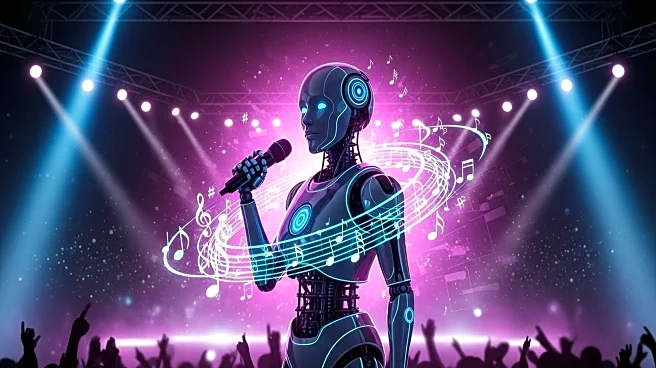What's Happening?
Japanese girl band AKB48 has released a new single created using artificial intelligence, following a songwriting competition where the AI-generated song was favored by fans over a human-written piece. The competition, aired on Nippon TV, featured a contest between a song written by AI, trained on the works and public statements of renowned J-pop producer Yasushi Akimoto, and a song directly composed by Akimoto himself. The AI's song, titled 'Omoide Scroll / Memory Scroll,' received 14,225 votes out of a total 24,760, surpassing Akimoto's 'Cecil,' which garnered 10,535 votes. The AI's victory was acknowledged by Akimoto, who expressed disappointment but also openness to being inspired by AI's creativity. AKB48, the world's largest pop group, has remained neutral in the competition, with fans expressing excitement over the AI-generated track.
Why It's Important?
The release of an AI-generated song by AKB48 marks a significant moment in the music industry, highlighting the growing influence of artificial intelligence in creative fields. This development could signal a shift in how music is produced, potentially reducing reliance on human composers and altering traditional songwriting processes. The success of the AI-generated song suggests that AI can effectively capture and enhance musical elements that resonate with audiences, potentially leading to broader acceptance and integration of AI in music production. This could impact the careers of composers and producers, as well as the economic dynamics of the music industry, where AI-driven content might become more prevalent.
What's Next?
Following the success of the AI-generated song, AKB48 and other music groups may explore further collaborations with AI technology to produce new content. This could lead to more competitions and experiments in AI-driven music creation, influencing the direction of future musical projects. Producers and artists might consider integrating AI into their creative processes, potentially leading to new genres and styles. The music industry may also face discussions on the ethical implications of AI in art, including questions about authorship and originality.
Beyond the Headlines
The use of AI in music production raises broader questions about the role of technology in creative industries. It challenges traditional notions of creativity and authorship, prompting discussions on the ethical and cultural implications of AI-generated art. As AI becomes more integrated into creative processes, it may redefine artistic expression and influence cultural trends, potentially leading to new forms of collaboration between humans and machines.











